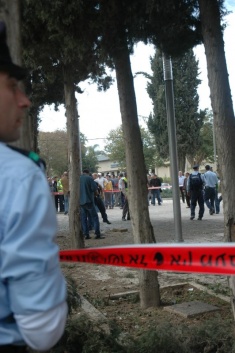
“Nobody was hurt, but there was a lot of damage,” he said. “And again, a lot of luck that nobody was hurt. “
One of the homes that sustained damaged was that of Noam and Mira Stahl, who were both at work at the time of the attack. Their three children were at school.
“I got the SMS that there was a mortar attack and to stay inside, and then a friend called and told me it hit by our house,” said Mira, who works in Sderot.
Their four-year old daughter Ela was at the kindergarten during the attack. She told Mira that when they heard the mortar hit, all of the children began to cry, Mira said.
Kfar Aza is a focus of mortar fire from Hamas in Gaza because of its proximity to the border. Unlike for Qassam rockets, there is no warning for mortars because they do not give off a heat signature, travel at a lower altitude, and come from a much closer range than Qassam’s.
“When we hear the first mortar land, then we respond to that as if it is a Tzeva Adom,” Noam said.
However, in that area of the kibbutz, there is not much people can do in response to an attack.
“We don’t have a safe room and the closest shelter is over there,” he said pointing behind the house. “We go to the room farthest inside the house and stay down underneath the windows. It’s not safe, but it is better than going outside. Most times people get hurt, they are outside.”
Even though the attacks have become more frequent, and some residents of the kibbutz have considered leaving, Noam and Mira plan to stay in the kibbutz.
“We hope that it will send a message to people that this is our home and the right thing to do is to stay.”
Plut said he thinks that most people intend to stay on the kibbutz.
“It depends on the person. Some people are more afraid than others. A lot of people just need a break, so they leave the kibbutz for a couple days during the week.
“The situation is problematic, though, and we expect the government to do something one way or another-either stop the attacks or make an agreement [with Hamas]. At the very least, people should have someplace safe to go.”The Stahl’s are going to go on with their lives, but it is not that simple.“We can’t just turn the page,” Mira said. “Yes, we will wake up in the morning, eat breakfast, go to school, go to work, and go to sleep at night. But we cannot just tell ourselves it is normal”










